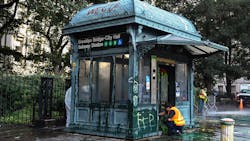Could U.S. transit agencies miss out on federal grants because they operate within ‘Anarchist Jurisdictions’?
Transit agencies operating in three U.S. municipalities identified by the U.S. Department of Justice as having “permitted violence and destruction of property to persist and have refused to undertake reasonable measures to counteract criminal activities” could have their applications for federal grant awards negatively impacted.
How and why?
The answer goes back to a Presidential Memorandum issued Sept. 2 where President Donald Trump directed the Attorney General and the Office of Management and Budget (OMB) Director to review federal funding to cities the administration believed permitted anarchy, violence and destruction. The Presidential Memorandum specifically named Portland, Ore., Seattle, Wash., New York City and Washington, D.C. (which was later removed per Attorney General Bill Barr’s directive).
“The federal government provides states and localities with hundreds of billions of dollars every year… My administration will not allow federal tax dollars to fund cities that allow themselves to deteriorate into lawless zones. To ensure that federal funds are neither unduly wasted nor spent in a manner that directly violates our government’s promise to protect life, liberty and property, it is imperative that the federal government review the use of federal funds by jurisdictions that permit anarchy, violence and destruction in America’s cities. It is also critical to ensure that federal grants are used effectively, to safeguard taxpayer dollars entrusted to the federal government for the benefit of the American people,” reads the memorandum.
The memorandum directs the Attorney General to consult with the OMB Director and the Secretary of Homeland Security to publish a list of “Anarchist Jurisdictions” that will be updated every six months. According to the U.S. Department of Justice, criteria for this label includes prohibiting the police force from intervening in the restoration of order, withdrawing law enforcement protection from a geographical area, disempowering or defunding police departments, refusing federal government assistance of law enforcement and “any other related factors the Attorney General deems appropriate.”
The memorandum directs the OMB Director to “issue guidance to the heads of agencies on restricting eligibility of or otherwise disfavoring, to the maximum extent permitted by law, anarchist jurisdictions in the receipt of federal grants.”
How would transit be impacted?
Those agencies operating within “Anarchist Jurisdictions,” which currently include New York Metropolitan Authority (MTA), Sound Transit, King County Metro and TriMet, could have their eligibility for federal grants restricted or their applications disfavored.
A Notice of Funding Opportunity (NOFO) from the Federal Transit Administration (FTA) published Oct. 8 for $10 million in grants through a new Public Transportation COVID-19 Research Demonstration Grant Program includes the following clause under evaluation criteria:
In addition, the department will review and consider applications for funding pursuant to this notice in accordance with the president's Sept. 2, 2020, memorandum, entitled Memorandum on Reviewing Funding to State and Local Government Recipients of Federal Funds that Are Permitting Anarchy, Violence and Destruction in American Cities, consistent with guidance from the Office of Management and Budget and the Attorney General and with all applicable laws.
The OMB Director had 30 days from the Sept. 2 Presidential Memorandum to provide guidance to government departments. A NOFO published from the FTA a week prior to the $10 million NOFO above did not include a similar clause or reference to the memorandum.
The American Public Transportation Association (APTA) issued a statement strongly opposing the inclusion of what the association called restrictive project eligibility criteria.
“These funds are critical for transit systems as they undertake extraordinary efforts to safeguard riders and employees, while facing unprecedented budgetary woes,” said APTA President and CEO Paul P. Skoutelas. “It is inappropriate and unjustified that criteria would be considered to prohibit certain public transit systems from receiving critical funds to support their efforts to respond to COVID-19.”
The pandemic has taken a significant toll on transit agency budgets and the administration’s restricting or disfavoring applicants due to the Presidential Memorandum exacerbates an already tenuous situation.
MTA’s deficit is expected to reach $19.1 billion by the end of 2024 with New York State Comptroller Thomas DiNapoli issuing a report this week calling the financial straits faced by MTA the “the greatest crisis in its long history.” Sound Transit projected in June it would lose $1 billion through 2021 due to the pandemic and TriMet expects to lose an estimated $63 million in revenue through June 2020, and projects a $135.4 million loss for Fiscal Year 2021.
“Just as public transit systems provide equal access to all residents, federal grants should be available to all public transit providers,” said Skoutelas.
About the Author

Mischa Wanek-Libman
Group Editorial Director
Mischa Wanek-Libman is director of communications with Transdev North America. She has more than 20 years of experience working in the transportation industry covering construction projects, engineering challenges, transit and rail operations and best practices.
Wanek-Libman has held top editorial positions at freight rail and public transportation business-to-business publications including as editor-in-chief and editorial director of Mass Transit from 2018-2024. She has been recognized for editorial excellence through her individual work, as well as for collaborative content.
She is an active member of the American Public Transportation Association's Marketing and Communications Committee and served 14 years as a Board Observer on the National Railroad Construction and Maintenance Association (NRC) Board of Directors.
She is a graduate of Drake University in Des Moines, Iowa, where she earned a Bachelor of Arts degree in Journalism and Mass Communication.
